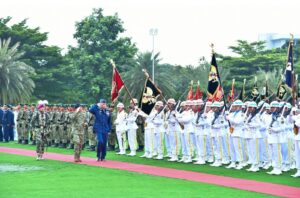Sri Lankan High Commissioner Visits High Court Bar Association Islamabad

Islamabad, The Gulf Observer: On 15th May Islamabad – The High Court Bar Association Islamabad had the distinct honor of welcoming His Excellency, Mr A.Christy Ruban the High Commissioner of Sri Lanka, on his official visit to the Bar. The distinguished guest was warmly received by Mr. SyedWajid GillaniPresident of the High Court Bar Association, Mr.Chaudhary ManzoorAhmed Jajja Secretary of the Association, Mr. Zaildar Ahsan Shah, Chairman International Relations Committee, Mr. Murtaza Khan Vice Chairman International Relations Committee, Mr. Safeer Shah Member International Relations Committee ,Mr. Chaudhary Yaseen Iqbal Member International Relations Committee, Mr. Fahad Chaudhary Member International Relations Committee , and Cabinet of Islamabad High Court Bar .
Upon arrival, the High Commissioner was given a warm reception and escorted into the Bar premises where the formal welcome ceremony was held. Mr. SyedWajid GillaniPresident of the High Court Bar Association, in his welcome address, introduced the esteemed guest to the legacy and history of the High Court Bar Association. He highlighted the establishment of the Bar and its unwavering commitment to upholding the Constitution, the rule of law, and the protection of human rights. He noted with pride the sacrifices made by the legal community in defense of democratic values and judicial independence in Pakistan.
Mr. Zaildar Ahsan Shah warmly welcomed the High Commissioner on behalf of the International Relations Committee of the High Court Bar Association. He thanked His Excellency for accepting the invitation extended by the Committee and for taking the time to visit the Bar.
He shared that the International Relations Committee was recently established under the guidance of the President and Secretary of the Bar. The purpose of this committee is to serve as a bridge between the High Court Bar and legal institutions abroad, helping to expand professional linkages and promote meaningful legal cooperation at the international level.
Following the President’s address, Mr. Zaildar Ahsan Shah Present a detailed overview of the proposal with Cabinet of High Court and International Relations Committee prepared for legal collaboration between Pakistan and Sri Lanka. He shared that the initiative focuses on building strong institutional and linkages between the legal systems of both nations.
This proposal outlines a strategic framework for structured cooperation between the legal communities of Pakistan and Sri Lanka. The initiative seeks to enhance bilateral legal collaboration through multiple channels, beginning with the establishment of a formal “Sister Bar” relationship between the Islamabad Bar Association and the Colombo Bar Association. This partnership would involve annual Pakistan–Sri Lanka Legal Forums, legal delegations, courtesy visits, and cultural exchange sessions. It would also support the issuance of joint statements on pressing international legal matters such as climate justice, human rights, and regional legal stability.
Academic institutions are central to this initiative, with proposed semester-based exchange programs for law students from leading universities in both countries. Short-term legal fellowships, joint moot court competitions, and legal writing workshops will cultivate young legal minds and build shared knowledge. These efforts will be institutionalized under a “Pak–Sri Lanka Law Scholars Network,” aimed at fostering sustained academic and professional relationships.
Judicial collaboration will also be emphasized through official visits and legal dialogues between High Court judges and senior legal professionals. Guest lectures at law schools and discussions on best practices in judicial processes and public interest litigation will promote mutual learning and capacity building. Training programs for young lawyers and judges will be introduced in areas such as digital transformation in legal systems, international arbitration, commercial law, human rights, and constitutional law. An annual “Pakistan–Sri Lanka Legal Development Workshop,” rotating between Islamabad and Colombo, will serve as a platform for these initiatives.
Joint legal research will be further encouraged through the launch of a collaborative journal, the “Pakistan–Sri Lanka Law Review,” focusing on legal topics of national and regional significance, including border laws, refugee rights, trade regulations, and water-sharing frameworks. To support technological advancements in the legal sector, both countries will cooperate on courtroom digitization, AI-based case management systems, and digital legal infrastructure. Pakistan will share its NADRA-linked legal database model, while Sri Lanka’s expertise in enhancing lower court efficiency will be explored for mutual adoption.
In order to promote professional exposure, observer programs and internships for young legal professionals will be arranged, allowing participants to attend court proceedings and gain insights into each other’s legal systems. Cultural diplomacy will be promoted through an annual “Legal Diplomacy Week,” featuring legal heritage exhibitions, documentary screenings, and high-level roundtables involving senior advocates, judges, and legal scholars.
To protect the legal rights of citizens in both countries, a bilateral Emergency Legal Coordination Framework will be established, offering timely legal assistance to nationals facing arrests, deportations, or civil disputes abroad. Finally, reciprocal legal library corners one in the High Court Bar Library, Islamabad, and the other in a Colombo law library will serve as dedicated spaces for legal texts, case law, and journals, facilitating cross-cultural legal understanding and academic engagement.
This comprehensive collaboration will strengthen legal professionalism through shared knowledge and experiences, enhance regional legal harmony, promote legal diplomacy and soft power, and upgrade institutional capacity in both countries through sustained academic and professional exchanges.
Mr. Zaildar Ahsan Shah emphasized that Pakistan and Sri Lanka enjoy deep-rooted historical and diplomatic ties built on trust, mutual respect, and regional cooperation. He noted that while both countries have long supported each other on political and diplomatic fronts, it is now time to give this relationship a stronger legal foundation.
He stated, these are not just ideas they are practical, well-thought-out steps that can lead to real collaboration between our legal communities. Through joint research, academic exchanges, and institutional partnerships, we can learn from each other’s experiences and grow together. This proposal is a roadmap for long-term cooperation that brings value to both nations. Our goal is to build legal bridges that support justice, learning, and shared progress.
Mr. Syed Safeer Shah, a respected member of the International Relations Committee, also addressed the gathering and warmly welcomed His Excellency, the High Commissioner of Sri Lanka. He expressed his happiness at the High Commissioner’s visit to the Bar and said it was an encouraging step for both sides.
In his remarks, Mr. Shah stated, “While we often see exchanges in areas like business, trade, and culture, legal collaboration has not received the same attention.
Strengthening legal linkages can play a major role in bringing our two countries even closer. In my view, this initiative to start legal cooperation between Sri Lanka and Pakistan is not only timely but also a very significant step forward.”
His Excellency, Mr. A. Christy Ruban, the High Commissioner of Sri Lanka, addressed the gathering with warm and sincere remarks. He spoke of the enduring friendship and strong diplomatic ties between Sri Lanka and Pakistan, built over decades of mutual respect and cooperation. He expressed genuine appreciation for the hospitality extended by the High Court Bar Association Islamabad and noted the significance of such interactions in deepening people-to-people and institutional bonds.
He went on to highlight key aspects of Sri Lanka’s legal system and appreciated the importance of legal dialogue between nations. Referring to the proposal presented during the visit, His Excellency described it as “excellent” and added, “This is a meaningful and well-structured initiative. He further said, “I will be personally sharing this proposal with the Ministry of Foreign Affairs in Colombo without delay. It is initiatives like this that pave the way for deeper ties. I strongly believe that through enhanced legal collaboration, Sri Lanka and Pakistan can further strengthen their already close friendship. This step will lead to greater cooperation, trust, and understanding between our legal communities, and I look forward to seeing it take shape.”
He added that this proposal is not only impressive in its content but also timely in its vision. It covers key areas that matter in today’s legal world from academic and professional exchanges to digital transformation, legal research, and shared learning. It is a well-structured roadmap that can take our legal relations to the next level.”
In his closing remarks, Mr. Chaudhary Manzoor Ahmed Jajja, Secretary of the High Court Bar Association Islamabad, conveyed his sincere gratitude to the High Commissioner for gracing the Bar with his presence. He described the visit as both timely and deeply meaningful, noting that such engagements go far beyond diplomatic formality they serve as bridges of understanding between two nations bound by shared values and mutual respect.
Mr. Jajja reaffirmed the Bar’s firm commitment to promoting sustained legal cooperation between Pakistan and Sri Lanka. He emphasized that legal diplomacy plays a crucial role in fostering people-to-people connections and institutional trust, particularly in a region where collective progress hinges on mutual learning and collaboration.
Mr. Chaudhary Manzoor Ahmed Jajja also shared that as Secretary of the Bar, he is fully committed to addressing the concerns and challenges faced by lawyers. He stated that every effort is being made to resolve the issues of the legal community with sincerity and dedication.
He added, “It is our commitment not only to strengthen legal linkages internationally but also to stand by our own lawyers here at home. We are determined to take this Bar to new heights, where it reflects the strength, unity, and dignity of the legal profession.”
He remarked, “This visit has added heartfelt warmth to the long-standing friendship between our two countries. It has not only inspired us but also opened promising new avenues for practical legal engagement. We look forward to seeing this proposal evolve into a living framework that brings our legal communities closer in the spirit of professionalism, partnership, and peace.”
The event concluded with a note of appreciation for Sri Lanka’s legal fraternity. “Sri Lankan lawyers have a legacy of courage and professionalism, and their contributions to justice and constitutionalism are deeply respected,” it was said.
The gathering was attended by senior lawyers, members of the Bar, legal academics, and representatives of legal institutions. It marked not just a ceremonial exchange, but a sincere step toward lasting legal cooperation between Pakistan and Sri Lanka.


